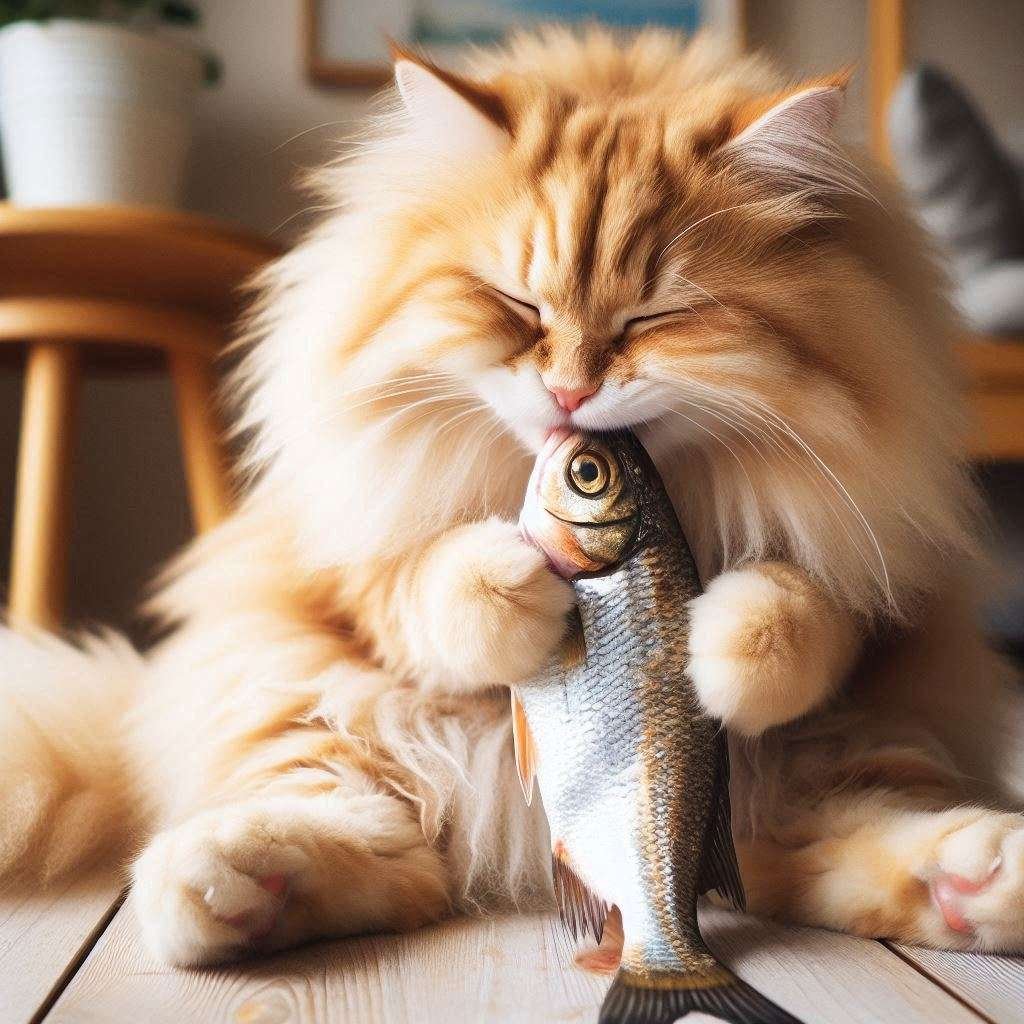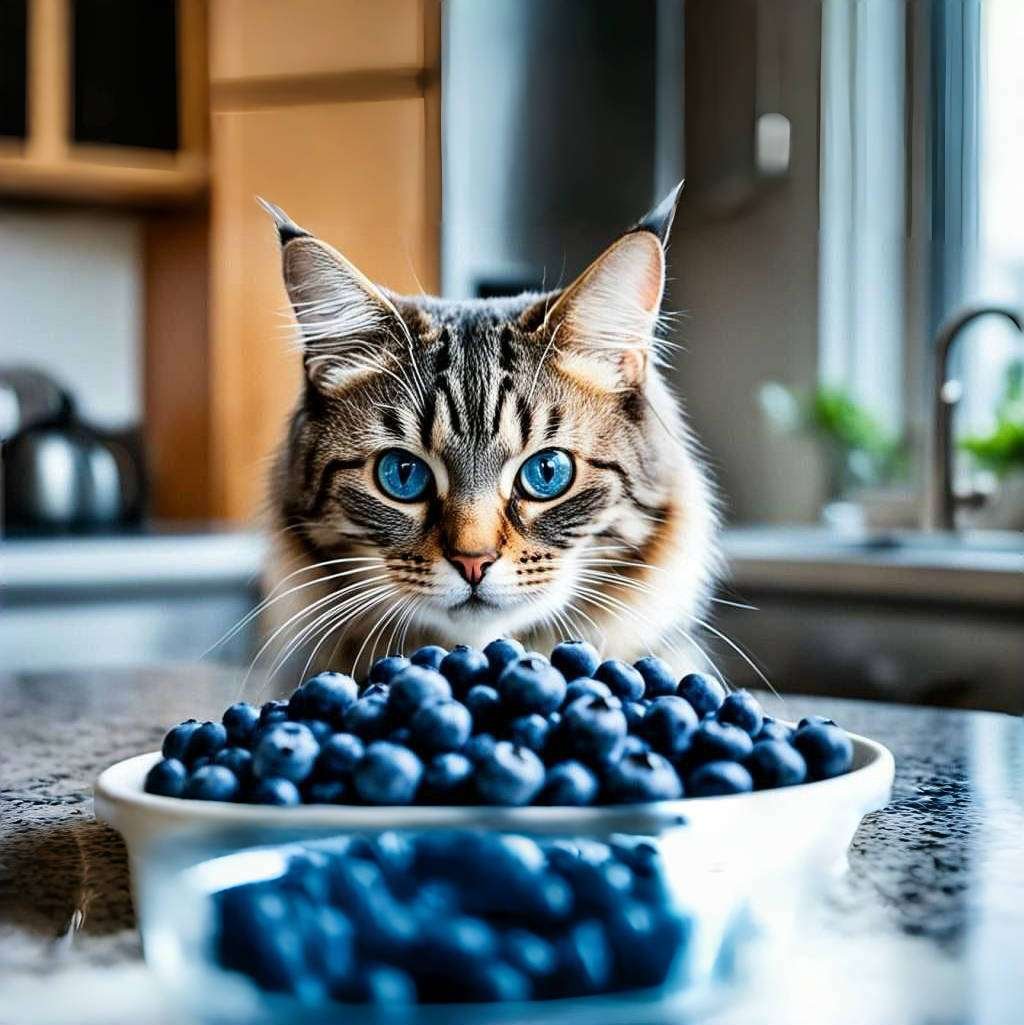As pet owners, we often think about sharing our food with our cats. Ham is a common question. can my cat eat ham?, or is it off-limits? We’ll look into what cats need to eat, what’s in ham, and the good and bad of giving it to your cat.
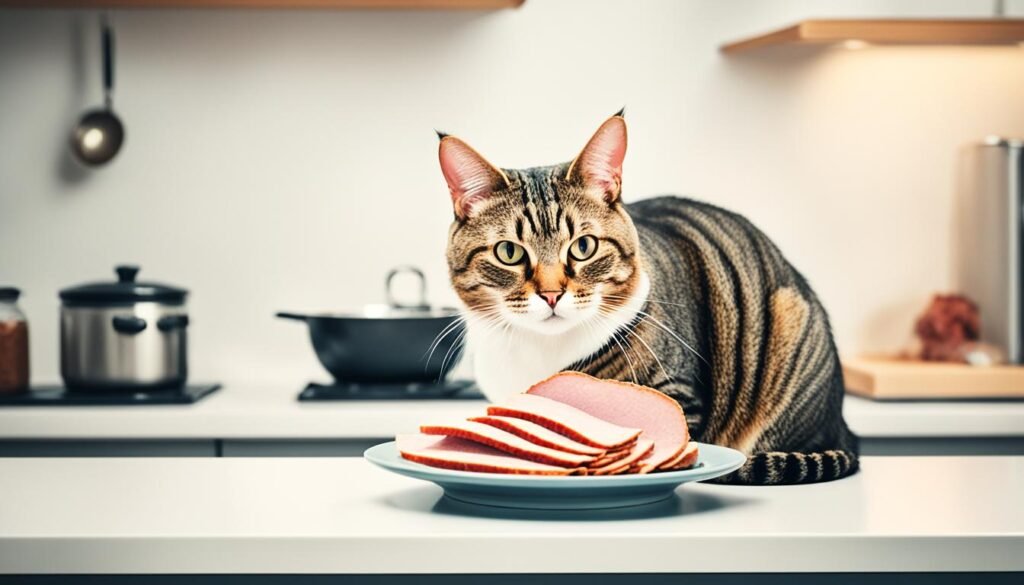
Key Takeaways
- Cats have specific dietary needs that may not align with human food choices.
- Ham can provide some essential nutrients for cats, but it should be fed in moderation.
- Potential risks of feeding ham to cats include high sodium content, preservatives, and the possibility of gastrointestinal issues.
- Veterinary guidance is crucial when introducing new foods to your cat’s diet.
- Balanced commercial cat treats may be a safer and healthier option for feline snacks.
Understanding Feline Dietary Needs
Cats need a diet mainly of animal proteins to stay healthy. These proteins, like those found in ham, are key for their muscles, growth, and energy.
Protein: A Vital Nutrient for Cats
Protein is key for cats. It helps build their muscles, organs, and tissues. Cats need a diet rich in protein, making up at least 25% of their daily calories.
The Importance of Taurine
Taurine is an amino acid cats can’t live without. It’s important for their heart health, vision, and overall health. Cats get taurine only from their food, making it crucial for a balanced diet.
Essential Vitamins and Minerals for Feline Health
Cats also need vitamins and minerals like vitamin A, vitamin E, calcium, and phosphorus. A good cat food should give them all these nutrients. This helps with growth, immune health, and overall health.
Knowing what cats need to eat is key to their health. A diet full of animal proteins, amino acids, and vitamins helps them live long, healthy lives.
The Truth About Cats and Ham
The smell of ham might make our cats curious, but it’s important to know it’s not always good for them. Ham’s curing and seasoning can change its nutrition, bringing risks for our pets.
Ham is full of protein, with 22 grams of protein per 100 grams. But, it also has a lot of sodium, at 977 milligrams per 100 grams. Cats only need about 42 milligrams of sodium per day. Too much ham can cause salt poisoning, leading to vomiting, diarrhea, and seizures.
Ham also has seasonings and additives that can harm cats. These include preservatives like nitrites, which can mess with the body’s pH levels. This increases the risk of thyroid problems and urinary tract infections.
Feeding ham to kittens is not good for them. They need a diet high in protein for muscle and brain growth. Too much ham can hurt their development and health.
Even a little ham as a treat is not always safe. Cats need a balanced diet with lots of protein and not much carbs. Eating too much ham or other high-calorie foods can make them gain weight and lead to serious health issues.
Before giving your cat human food, talk to your vet. They can tell you what’s best for your cat’s diet and how much treat is okay.
Nutritional Content of Ham
Ham is often seen as a tasty treat for cats. But, it’s key to know its nutritional facts before adding it to your cat’s diet. Ham can give cats protein, which is crucial for their health. Yet, it has high sodium and additives that could be bad for them.
Protein in Ham
Ham is packed with protein, vital for cats’ muscles and health. Cats need a lot of protein, about two grams per pound of body weight daily. Just 2 ounces of ham can meet a cat’s protein needs.
Sodium and Additives in Ham
The process of curing and seasoning ham raises its sodium levels. Cats should have only 42 mg of sodium a day. A single slice of deli ham can have over 360 mg, which could harm cats with kidney or heart issues. Ham also has additives like nitrates and phosphates that are not good for cats.
| Nutrient | Amount in 2 oz (57g) of Ham | Percentage of Daily Value (DV) |
|---|---|---|
| Protein | 14g | – |
| Sodium | 360mg | 857% of DV |
| Selenium | 42-76 mcg | 76% of DV |
| Phosphorus | 154mg | 11% of DV |
| Zinc | 1.3mg | 9% of DV |
Potential Risks of Feeding Ham to Cats
Cats can eat ham, but it’s not the best choice for them. Ham has a lot of sodium which can make cats dehydrated and harm their kidneys. Also, seasonings and additives like garlic or onion in ham are toxic to cats.
Feeding ham to cats also raises the risk of allergic reactions. These can be mild like stomach issues or severe like skin problems or trouble breathing.
High Sodium Content
Cats can’t handle as much sodium as humans. The sodium in ham can cause dehydration and stress on a cat’s kidneys. This can lead to health issues over time.
Seasonings and Additives
Many hams have spices, preservatives, and other additives that are bad for cats. Things like garlic and onion, common in ham, are toxic to cats. They can cause serious stomach problems or even anemia.
Potential Allergic Reactions
Adding ham to a cat’s diet can lead to food allergies. Cats might react to the proteins or other parts of ham. This can cause skin issues, stomach problems, or breathing trouble.
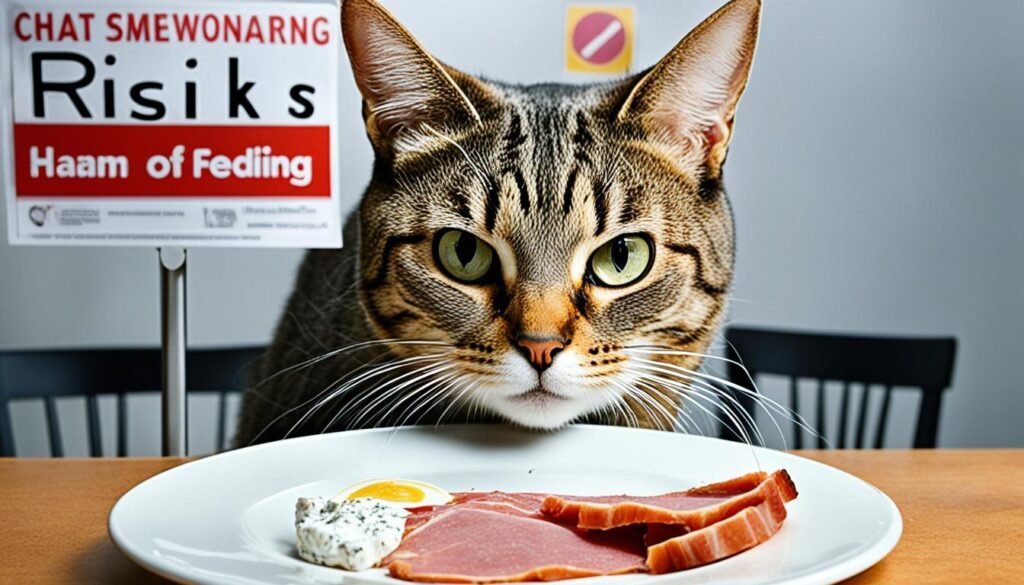
Occasionally giving a small amount of plain, unseasoned ham to some cats is okay. But, it’s best to avoid ham as a regular food. Cats do better with lean proteins like chicken, turkey, or fish for their diet.
Safe Feeding Practices for Cats
Keeping your cat healthy means feeding them right. Start by picking top-notch cat food that meets the AAFCO standards. This makes sure your cat gets the right nutrients for their needs.
It’s important to control how much you feed your cat. Too much food can make them overweight and lead to health problems. Always check the serving sizes on the food packaging. Stick to a regular feeding schedule and make sure fresh water is always available. Also, keep treats and human food to a minimum since they can upset your cat’s stomach.
When giving your cat human food, be careful. Some foods like cooked, plain meat or fish can be okay as treats. But, never give them processed meats like ham. These can be too salty and have bad additives for cats.
- Choose high-quality, AAFCO-approved cat food for a balanced and complete diet.
- Practice portion control and maintain a consistent feeding schedule.
- Provide fresh water at all times.
- Limit the amount of treats and human food offered to your cat.
- Be cautious when feeding your cat human food, and avoid anything that could be potentially toxic or unhealthy.
By following these safe feeding tips, you help your cat get the right nutrition. This cuts down on the risks of bad feeding habits. Always talk to your vet for advice on the best food plan for your cat.
Portion Control and Frequency
It’s key to control how much and how often you feed your cat for their health and happiness. The right food amount depends on your cat’s age, weight, and activity. This helps avoid obesity and other weight problems.
Feed your cat several small meals a day, not just one or two big ones. This matches their natural eating habits and helps control their appetite and metabolism. The exact amount and schedule vary, so talk to your vet for a plan that fits your cat.
Portion Sizes for Cats
- Kittens and young cats need to eat more often, with food amounts based on their growth and activity.
- Adult cats should get 20-30 calories per pound of body weight daily, spread across several meals.
- Senior cats might eat less because they move less and their metabolism changes.
- Consider your cat’s weight, body condition, and health when figuring out how much to feed them.
Controlling portions is key to stopping your cat from getting too fat. Obesity can cause diabetes, joint problems, and breathing issues. By watching how much your cat eats and adjusting their diet, you can keep them at a healthy weight for a long, happy life.
Feeding Frequency for Cats
- Kittens and young cats: 3-4 small meals a day
- Adult cats: 2-3 meals a day
- Senior cats: 2 meals a day, or more if they need it
Every cat is different, and their diet may change as they age. Keep talking to your vet and watch your cat’s health and behavior. This way, you can make sure they get the right food and portions to stay healthy.
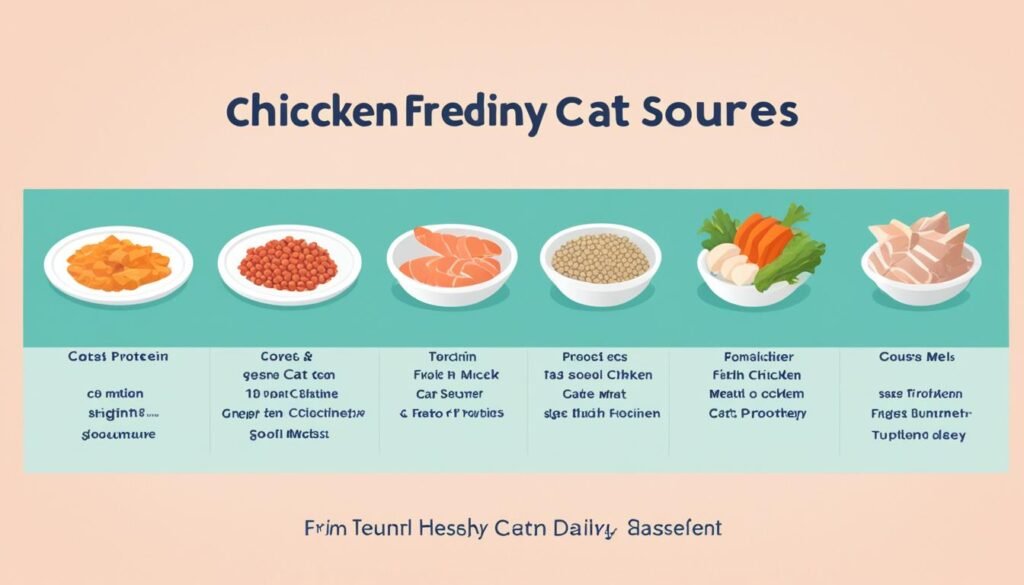
Alternatives to Ham for Cats
Ham isn’t the best choice for cats. But, there are many other treats and snacks that are safe and healthy. These include cat treat options, lean natural cat foods, and some cat-safe human foods like cooked chicken or tuna. Always check with your vet before adding new foods to your cat’s diet to make sure they’re safe and right for their health.
Here are some healthy snacks for cats instead of ham:
- Fish, like tuna or mackerel, helps with your cat’s eyes, joints, and brain.
- Cooked poultry is a natural choice for cats.
- Cheese is full of calcium and protein.
- Bananas are a healthy treat but give them in small amounts because they’re high in sugar.
- Berries, like blueberries and strawberries, are low in sugar and full of antioxidants.
- Cooked carrots are a safe and healthy snack for cats.
- Pureed pumpkin is rich in fiber and nutrients that help with digestive issues.
- Cooked eggs are a protein-rich food that cats can safely eat.
Remember, while these options are safe and good for cats, always talk to your vet before trying new foods. This ensures the new food fits your cat’s diet and health needs.
When changing your cat’s diet, introduce new foods slowly and watch how they react. By giving your cat a variety of healthy, cat-safe options, you can make sure they get the nutrients they need. This helps avoid health risks from foods like ham.
Addressing Common Myths About Cats and Human Food
Many pet owners believe wrong things about feeding their cats. It’s key to know what cats need to stay healthy. We’ll look at some myths about cats and human food and give the right info to clear them up.
Myth: Cats Can Eat Anything Humans Eat
This idea is wrong. Cats need a diet mostly of animal proteins to stay healthy. Feeding them human food, like ham, can harm their health.
Myth: Cats Need a Varied Diet
Many think cats need different foods every day. But, they actually do best on a steady, high-quality cat food. This food has all the nutrients they need. Changing a cat’s diet too much can cause health problems.
Myth: Homemade Diets are Better for Cats
Homemade diets might seem healthier, but they can be bad for cats. It’s hard to get the right balance of nutrients without a vet’s help.
Commercial cat foods are made to fit a cat’s needs. They give cats all the vitamins, minerals, and amino acids they need, like taurine, for good health.
Myth: Cats Can’t Eat Pork
Pork can be okay for cats, but only lean cuts. Avoid seasoned or processed pork like ham because it has too much salt and bad additives.
By knowing the truth about these myths, pet owners can feed their cats right. This helps their cats stay healthy and happy.
“Cats are obligate carnivores, requiring a diet primarily consisting of high-quality animal-based proteins for muscular structure and growth.”
can my cat eat ham?
We often wonder if we can share our favorite foods with our cats. Ham is a common question. The answer is not simple. Cats can have a little bit of ham, but we must be careful.
Ham is high in fat and salt, which can harm cats. It can cause pancreatitis, diarrhea, and vomiting. Cats don’t drink enough water, and ham’s salt can make dehydration worse. Cats with kidney, heart, or urinary problems should avoid ham.
But, ham can also give cats important nutrients like B-vitamins, zinc, and selenium. These are key for their immune system and health. Just remember, ham should only make up 10% of their daily food to prevent obesity and heart disease.
Choose fresh, cooked, and plain ham for your cat. Avoid sandwich ham and honey ham because they have additives and too much sodium or sweeteners. These can be bad for your cat.
“Cats tend to under-consume water, and salt-rich foods like ham can contribute to dehydration.”
Every cat is different, so talk to your vet before giving them new foods or treats, like ham. They can tell you the right amount and how often to give it. They can also warn you about risks or allergies.
In short, cats can have a little bit of ham but be careful. Know the risks and benefits to decide if ham is right for your cat. Always think about their health first.
Consulting with a Veterinarian
When it comes to your cat’s diet, it’s always best to consult with a veterinary expert. They can give you personalized veterinary advice on cat diets. This advice helps you customize your cat’s diet for their specific nutritional needs.
When to Seek Professional Advice
There are several situations when you should consider consulting a vet about cat food:
- If your cat has any underlying health conditions, such as kidney disease or diabetes, that may require a specialized diet.
- When introducing new foods, like ham, to ensure they won’t cause any adverse reactions or nutritional imbalances.
- If your cat is experiencing weight issues, whether underweight or overweight, to develop a healthy feeding plan.
- When transitioning your cat from a dry food to a canned or raw diet, or vice versa.
Tailoring Your Cat’s Diet to Their Specific Needs
A cat nutrition expert can help you customize your cat’s diet. They consider your cat’s age, activity level, and health concerns. They also guide you on portion sizes and feeding schedules. This ensures your cat gets all the necessary nutrients.
Regular check-ins with your veterinarian keep you updated on the latest veterinary advice on cat diets. They help you make changes to your cat’s diet as needed.
Your cat’s health and well-being should be your top priority. A veterinary professional is the best resource to help you consult about cat food. They ensure your feline friend is thriving.
Conclusion
Cats might like the salty, protein-rich taste of ham, but it’s not good to give it to them often. Ham has too much sodium and seasonings that can be harmful. It’s better to feed your cat food made just for them, which has all the nutrients they need.
When thinking about giving your cat human food, remember to keep portions small and choose plain foods without seasonings. Always talk to a vet before adding new foods to your cat’s diet. This helps keep your cat healthy, supports their immune system, and prevents stomach problems.
While cats might enjoy a small, plain piece of ham as a special treat, it shouldn’t be a big part of their diet. The best way to keep your cat healthy is with a balanced cat food and advice from your vet. This ensures they get the right nutrition to live a happy life.
